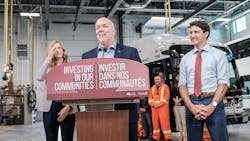Joint funding to allow new vehicle purchases for British Columbia transit providers
Public transit users in British Columbia will soon experience their rides on new buses following news that the federal government of Canada and provincial government have committed more than $79 million (US$60.44 million) to purchase new buses for use in Victoria and communities throughout the province.
The joint funding will allow up to 118 new buses to be purchased to replace others that have reached the end of their life cycle and to add capacity in communities that have seen an increase in ridership. The federal and provincial government will each contribute more than C$31 million (US$23.72 million) and local funding sources will contribute more than C$16 million (US$12.24 million) to the project.
“Many British Columbians depend on public transit to get where they need to go safely and efficiently. As communities in B.C. continue to grow, investments in public transit need to keep pace,” said Prime Minister of Canada Justin Trudeau. “By investing in reliable, efficient public transit, we are making a real difference in the lives of British Columbians, while protecting our environment and making our communities stronger.”
This investment will help meet British Columbians’ transportation needs while cutting air pollution and making its communities better places to live. It includes funding for 10 long-range electric buses that will provide greener transportation options in Greater Victoria. The British Columbia government notes that the new buses will be more efficient, have improved accessibility and safety features, and will support BC Transit's new NextRide technology and closed-circuit television security cameras. Additionally, the new vehicles will have vehicle tracking and new payment technologies.
“Our government is committed to making life more affordable for British Columbians, while reducing greenhouse gas emissions, and investments like this will help us do just that,” said Premier of British Columbia John Horgan. “Working together, we can provide transit that people need and we can put public transit on a solid road towards a truly sustainable future.”
President and CEO of BC Transit Erinn Pinkerton added, “These valuable partnerships have enabled BC Transit to actively pursue and implement low carbon technologies as we strive towards a cleaner, greener transit fleet.”
The federal investment for this project is provided through the Public Transit Infrastructure Stream, which is part of the Investing in Canada Plan. The 12-year plan calls for the federal government to invest more than C$180 billion (US$137.7 billion) in public transit projects, green and social infrastructure, trade and transportation routes and Canada’s rural and northern communities.
“Public transit infrastructure is vital to building strong, sustainable communities where all residents have access to essential services and opportunities, and businesses can thrive,” said Canada’s Minister of Infrastructure and Communities François-Philippe Champagne. “This investment in modern, eco-friendly vehicles serving communities across British Columbia will ensure that public transit services can continue to provide convenient, accessible transportation options that will improve the quality of life for residents today and contribute to a greener future.”
About the Author

Mischa Wanek-Libman
Group Editorial Director
Mischa Wanek-Libman is director of communications with Transdev North America. She has more than 20 years of experience working in the transportation industry covering construction projects, engineering challenges, transit and rail operations and best practices.
Wanek-Libman has held top editorial positions at freight rail and public transportation business-to-business publications including as editor-in-chief and editorial director of Mass Transit from 2018-2024. She has been recognized for editorial excellence through her individual work, as well as for collaborative content.
She is an active member of the American Public Transportation Association's Marketing and Communications Committee and served 14 years as a Board Observer on the National Railroad Construction and Maintenance Association (NRC) Board of Directors.
She is a graduate of Drake University in Des Moines, Iowa, where she earned a Bachelor of Arts degree in Journalism and Mass Communication.
